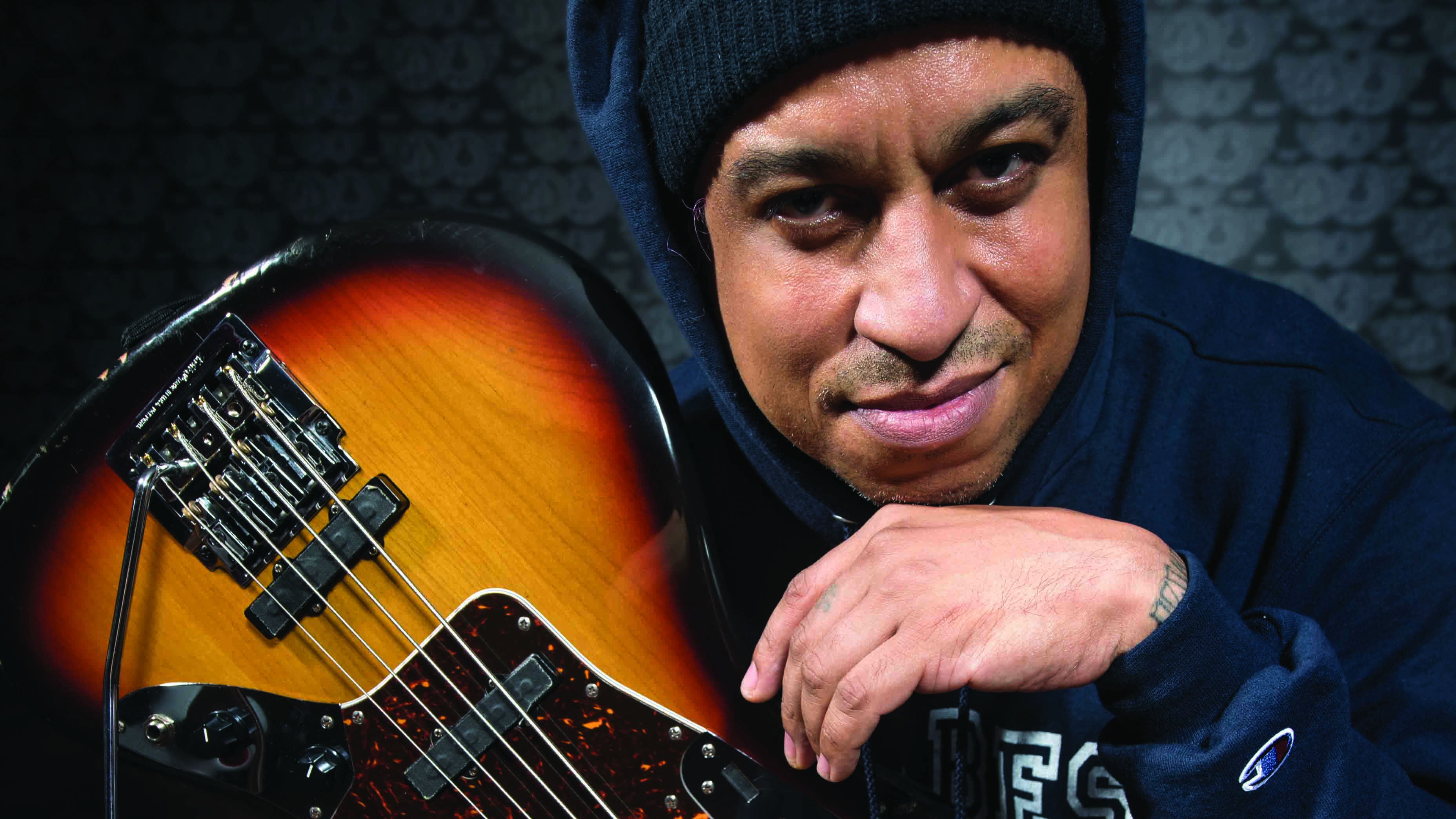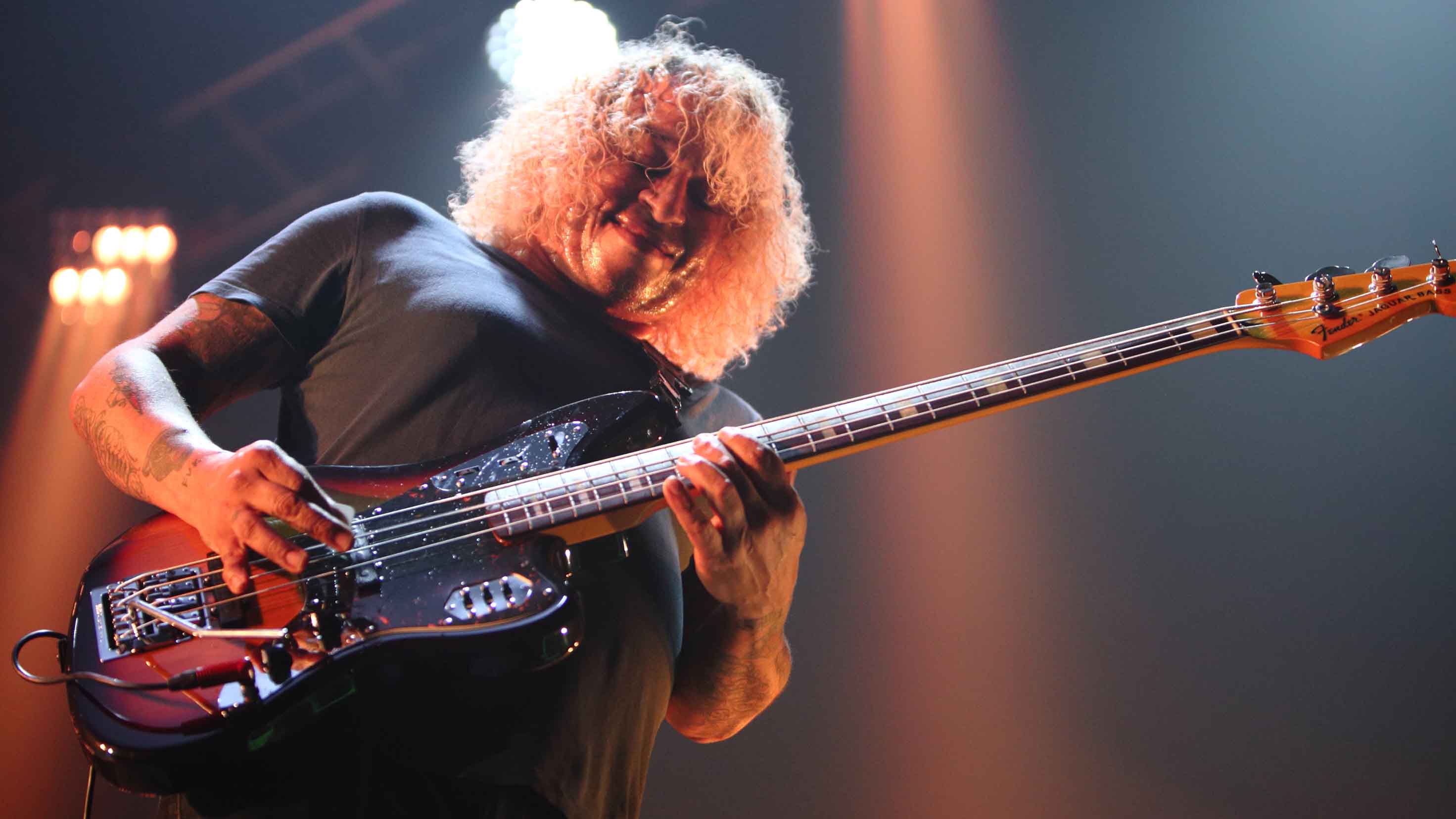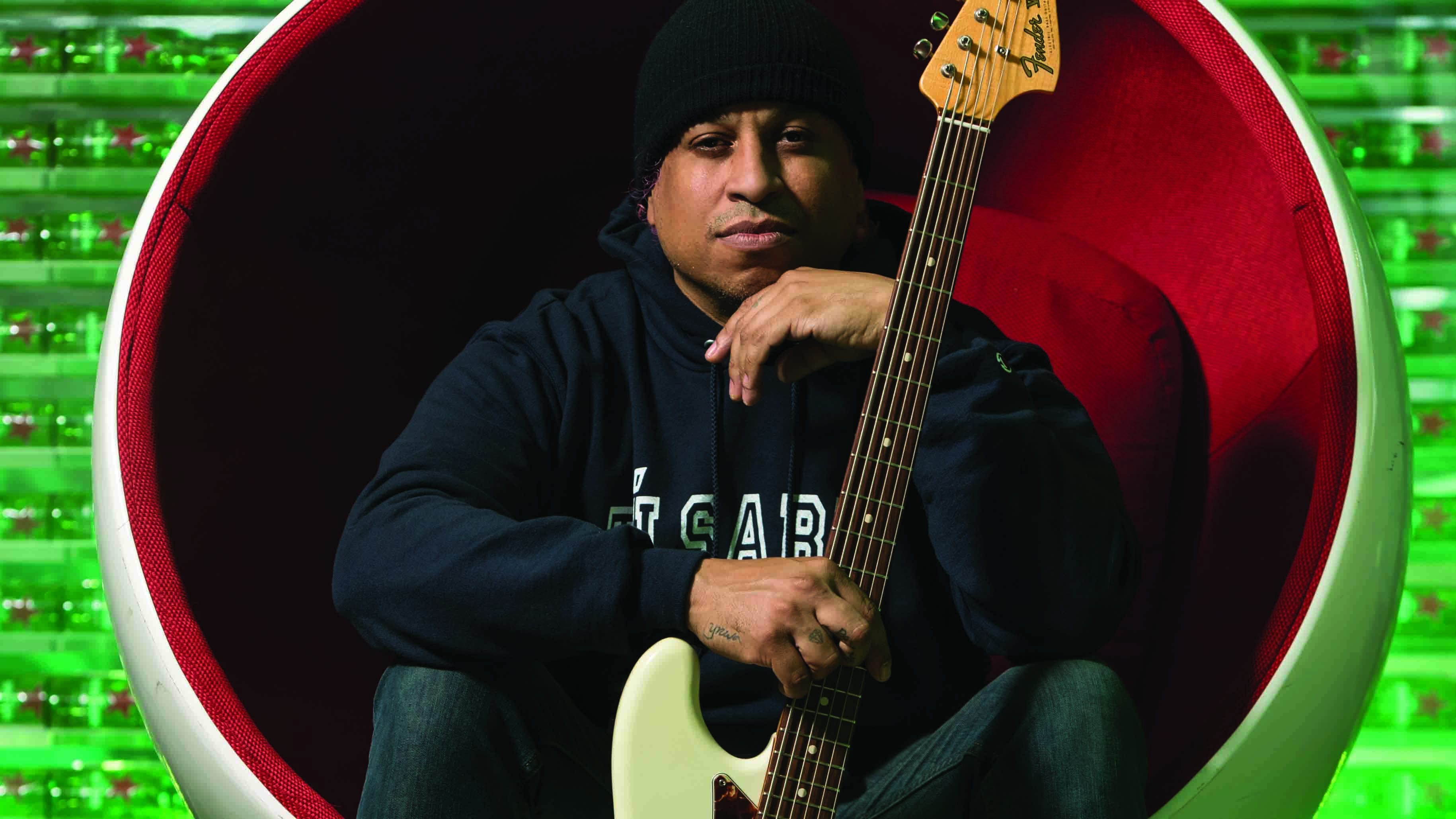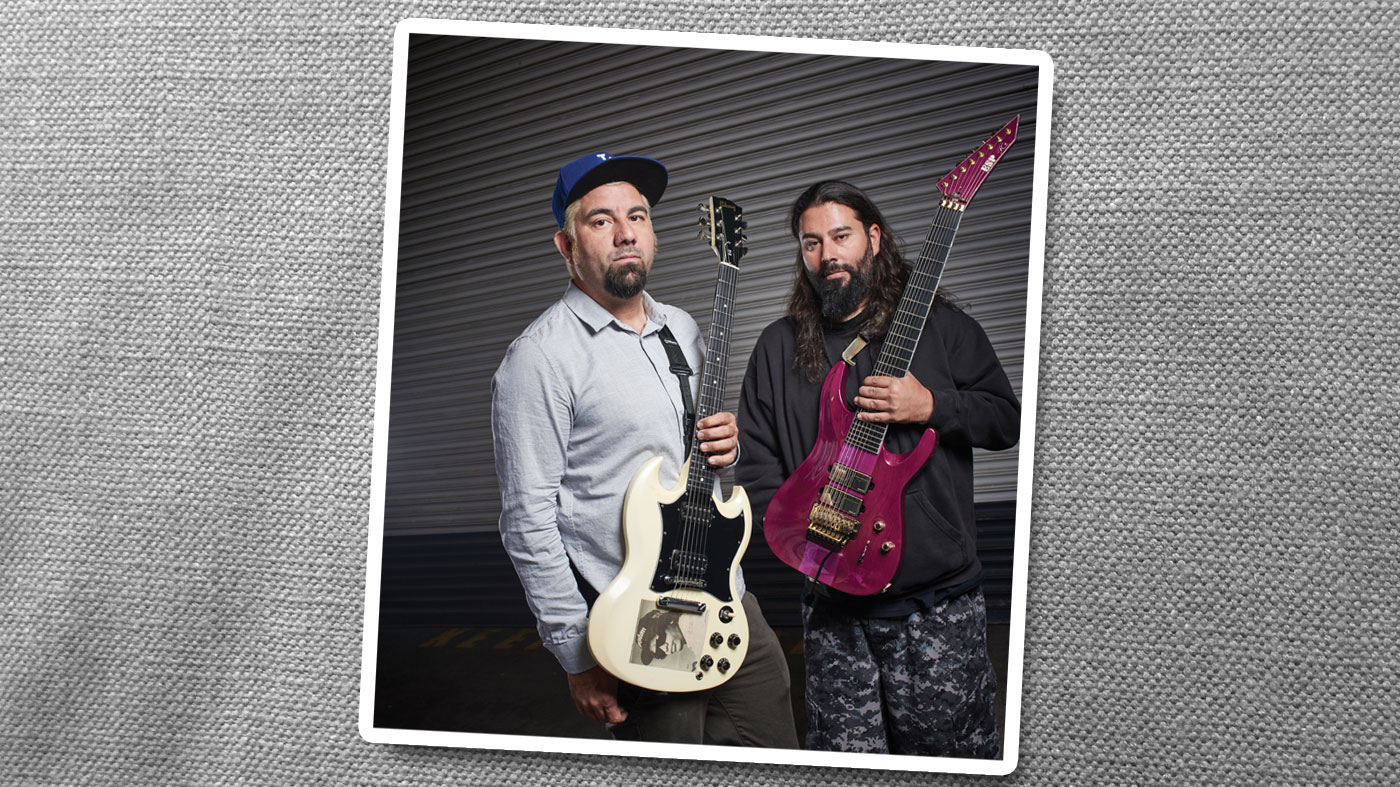Deftones bassist Sergio Vega: "The whammy bar shouldn’t just be relegated to guitar"
Bass player talks making Gore and his love of Fender VIs

Every now and then you get a band that genuinely defies expectations. The Sacramento quintet Deftones are one of this elite, formed in 1988 and emerging from the almost wholly regrettable nu-metal sound of the mid to late-'90s with a deeper, immensely textural approach of their own.
Anyone of sound mind is urged to see them if at all possible, not least because of the phenomenal bass playing of Sergio Vega, a member since 2009.
Vega came into the band alongside vocalist Chino Moreno, guitarist Stephen Carpenter, keyboard player Frank Delgado and drummer Abe Cunningham after the band's previous bassist Chi Cheng was left in a coma after a car accident in 2008.
Longterm readers of BGM will recall an interview we ran with Cheng in 2003, in which he explained his sparse, powerful bass style: any successor to his role would require serious presence and skill.
Fortunately, Vega was exactly the right candidate – an outspoken veteran of the post-hardcore band Quicksand, a cult group with a popular fanbase of their own.
Cheng never emerged from his coma, dying in 2013: Vega has filled his position since then, composing and playing on three Deftones albums – Diamond Eyes (2009), Koi No Yokan (2012) and last year’s Gore.
Like his predecessor, when we sat down to chat with Vega, he was refreshingly honest about the pleasures and pitfalls of life in a band with as combative an artistic vision as this one. Read on and learn...
Get the MusicRadar Newsletter
Want all the hottest music and gear news, reviews, deals, features and more, direct to your inbox? Sign up here.
How did the bass parts go down on Gore, Sergio – smoothly or otherwise?
We did everything and anything that would work. We usually wind up doing a live pass of the songs with Abe
"All of the above! They went down smoothly, but it was an adventure, and a lot of it was a different approach for us. This time around we would do two weeks of writing, a few days of rehearsals and then go do a run of shows for the previous album, Koi No Yokan. That’s why there’s a four-year span of time between Koi and Gore. It’s not that Gore took longer to write, it was because we were still actually touring Koi. It was kinda cool doing it that way."
Did you record the bass live or isolated?
"We did everything and anything that would work. We usually wind up doing a live pass of the songs with Abe. The main thing is that he is comfortable. From Diamond Eyes on, we’ve done tempo-mapping, where Stephen and I lay down scratch tracks for Abe. He then has the song in full with no drums, and he can just play over and over again to his heart’s content."
Playing the songs without drums sounds like a tricky thing to pull off.
"By that point the songs have a lot of air miles, because we’ve been playing them a lot, and playing them without drums is a nice challenge, especially locking in with Stephen. He and I have a really nice dynamic in the way that we interface with each other, even before you add Chino’s guitar playing into the mix."
You switched from your usual Fender Jaguars to a Fender Bass VI on Gore. Why?
"I always wanted to have a whammy bar on my bass, and I’m a huge My Bloody Valentine fan. I always liked the idea of incorporating a little undulation into the strumming, and how that was utilised in MBV was a big deal to me. I felt like that shouldn’t just be relegated to guitar: I have the opportunity to do that in my register too, so I got a couple of VIs when we were making Koi.
"Those songs were already written, so the VIs didn’t have a place there, but it allowed me a couple of years to develop the instrument and get a good, nice tone for it that spoke to both the lower end and the higher end of its register. By the time we started writing Gore, I was really well versed in the instrument and started writing with it. No-one said anything: as long as no-one says anything, that’s a good thing!"

Why not just switch to a regular extended-range bass?
"I really don’t like five- and six-string basses, the ones that most people know. This is counter to most people’s philosophy, but I feel that lower is not heavier. Lower is muddier, and actually lighter. It doesn’t get much heavier than Metallica in standard tuning, I’m sorry! You can get sludgier, but sludgier is not an attribute that resonates with me."
What tunings do you use?
"We have multiple tunings: we are rarely playing in the same tuning. From Diamond Eyes on, we’re all in different tunings. I play in five different tunings – for four-string basses, I play in standard, drop D, drop C#, and drop C, and then the VI is in standard. I mess with it in drop D, but that never became a song."
So how many basses do you take on tour?
"I have two basses for each tuning."
Eight basses, plus the Fender VI?
There’s a world of difference between drop C# and drop C. Drop C is far darker. It’s my darkest tuning
"Yeah, and we all have multiple rigs and basses at home, so I’m sitting on 25 to 28 Jaguar basses. I only have two Custom Shop VIs because they were very expensive – $3,500, even as a Fender artist."
Have you never felt the urge to simplify your setup?
"No. Different tunings colour the notes differently, and that’s major. There’s a world of difference between drop C# and drop C. Drop C is far darker. It’s my darkest tuning. When properly applied, it bumps super-hard, whereas C# gives a lift, and the upper end of my tone comes out a bit more. It brings different things out of you, and once you get into drop D and E, you get to do things that the other tunings don’t translate as well.
"I’m forever grateful to the Deftones for opening me up to that. The tunings vibrate differently. There’s darker, there’s lighter – and one thing about Deftones is that we’re really tone-driven. We get our patches first and then have riffs. We don’t have songs and then get tones."
When I interviewed Chi Cheng 14 years ago, he said that Deftones’ intra-band relationships were good but that he had to fight his corner when it came to the bass parts. Is it the same dynamic for you?
"No, I’m coming from a whole different world. I’m coming from another band with an established voice. Being in Quicksand, and having the Deftones guys be fans of Quicksand, gave me a lot of leeway, so I have my approach and I have my thing. They’re super-collaborative, both bands, and also very headstrong, and I am as well. We just gotta deal with it. We all have to deal with each other. It’s really that simple."
What else is different between now and Chi’s era?
I’m not a reactionary bassist, I don’t wait for a song and fit in. That’s my biggest problem with rock: the way that it treats the bass
"The songwriting is different than when Chi was in the band, because I come in with songs and we send each other riffs and we add to each other’s things. The conversation never ends. I can’t say what it was like before me, but I’m not a reactionary bassist, I don’t wait for a song and fit in. That’s my biggest problem with rock: the way that it treats the bass. I don’t even like many rock bassists, I’m like ‘I can’t relate to you!’"
Why not?
"Because I write songs! I write things! I don’t wait! If a homie has a riff, like if Chino starts with a riff, I got you. And I got your second riff, and I arrange, and I sing. We all do everything. So I can’t relate to the idea that by virtue of your instrument you’re assigned a role or a place. It’s asinine. Seriously, I hate it."
You’ve seen bassists relegated to a junior position, then?
"A lot of people have come to me and said ‘Play bass on the song’ and usually that person’s song is a collection of chord progressions that were probably ripped off. [I think,] ‘More than likely you need someone to add life to your ripped-off material, and you’re not going to credit them. You’re going to say that you wrote something, but you’re actually a plagiarist looking for a way out. I’m not your boy.’ I hate it."
How did you get into bass?
"As a young kid I got into bass through reruns of The Partridge Family and Tom & Jerry cartoons. There’s a Tom & Jerry cartoon where Tom the cat is playing an upright bass to a girl and singing Is You Is Or Is You Ain’t My Baby? He’s wooing this girl, who is a cat, with a bass. I was like ‘Yeah, I’ll mess with that!’ Then I’d watch The Partridge Family, and the bassist Danny Partridge was the bad boy.
"So I associated bass with a) getting girls and b) being bad. I was like ‘I’m down with that’. I also have an older cousin who was in new wave bands, and the guy who played bass with him was really cool. So every time I saw bass, it was in a cool capacity. I was like 13, and I was like ‘Bass is bad, and horny, and cool!’"

How did your bass-playing progress?
"When I was in junior high school in the Bronx in New York City, I joined orchestra and started playing upright bass. We would do Elgar’s ‘Pomp And Circumstance’ and crap like that. My friends and I started to learn '80s songs, like Maneater by Hall & Oates. We had a trio: there was a horn player, a drummer and myself on double bass, and the horn player did the vocals. We’d play in assembly and people would get all stoked. It was great."
So when did rock music come along?
"I used to paint trains and write graffiti, and one guy who I did that with was into the Police. I was like ‘Whoa, what is this?’ because it blew my mind. Then there was a TV channel called U68, with a video show that turned me onto my first guitar bands, like Twisted Sister. That stuff was so radical to me.

"Later, I made my way from the Bronx to Lower Manhattan, where I went to a club called Danceteria all the time. I was way underage, but that was prior to them caring. If you looked cool, they’d let you in. I bought all the bands off one girl’s jacket. I never met her, but she’s my biggest influence. I thought I got turned onto punk, but actually I got turned onto goth."
Which bands were these?
"I was into The Cure, the Cult, Alien Sex Fiend – everything I could get off Batcave Records. From there I got into Discharge, Crass, Flux Of Pink Indians, Conflict, all the British bands. Things became politically charged, and I never looked back. And then a producer named Jerry Williams – who recorded all the early Bad Brains and Beastie Boys stuff – opened me up to classic rock, where I got my writing chops, from Black Sabbath and Cro-Mags and Amebix."
Amebix had a great bass player, Rob Miller, whose stage name was The Baron.
Rob Miller is my favourite bass player on earth. I have the Amebix logo tattooed on my chest. What I really liked about him was his picked slides
"He’s my favourite bass player on earth. I have the Amebix logo tattooed on my chest. What I really liked about him was his picked slides, which I do a lot of in Deftones and I did in Quicksand. So you’re up at the top and you slide down, but you’re picking the whole time. It’s the best thing ever."
Were you in any bands before Quicksand?
"I was in bands prior to that, but like a lot of New York bands they didn’t last very long. I was the second bass player in a band called Absolution, which got me shows at CBGBs, which was a big deal.
"I went to college to study philosophy, but it was non-matriculated [a full degree was not awarded] because my grades were so bad. It was partly political: I was into punk, and I despised the paradigm because I was an über-anarchist, but it was sad because my parents were college professors, and they were not happy. They’re proud of me now, though: their view is that you have to stay true to your artistry, and things will fall into place, even though they may not like it aesthetically."
What was your first bass guitar?
"A friend loaned me a generic, no-name Silverburst bass – that I never gave back – and I started trying to write songs. The main bass in Quicksand was a Guild Pilot. I got it from Harley Flanagan of the Cro-Mags, who I became friends with because we were in the same subsect. It was a vaguely spiritual group, vegetarian or vegan, and we didn’t drink but we smoked weed.
"Jerry Williams was the hub for all those people, and everyone would hang out at his apartment and listen to music. To me, meeting Harley was like meeting Paul McCartney. Music was a real outlet for people like him, not a career."
Which bass players influenced you?
In reggae, the guitar is secondary. The guitar is giving you the framework, but the bass is the melody
"Reggae and dancehall artists like Sly & Robbie. I had to look for bass-driven music, and in reggae, the guitar is secondary. The guitar is giving you the framework, but the bass is the melody. That music influenced my songwriting, because you have to say something important with the bass melody without making the lines overwrought. I quickly became opposed to reactionary bassists who make their mark by doing fills. Fills are superfluous for my taste."
What’s your philosophy with bass parts?
"A part should be integral, and have space and be open. The song comes first, so your parts have to make sense. Let everyone else react to you and find their space. For example, if I come up with something that Stephen is stoked about, he’ll just match it, or other times we’re totally the opposite of each other. He’ll play low down on an eight-string guitar and I’ll be like ‘Wow, you just gave me all this room!’ or sometimes I’ll start with an arpeggio really high on the neck and he’ll play low."
How did you first encounter Deftones?
"I met them in 1995 on the first Warped tour, when Quicksand were on the bill too. They were doing a leg of the tour. I hadn’t heard of them yet, and a friend said, ‘You gotta go see Deftones.’ With my mindset at the time, I was all like, ‘Are they a hardcore band?’ and my friend said ‘They’re not, but they love the Bad Brains.’ I went, and the energy was palpable: they were really vibrant and alive.
"After that I went over to their Winnebago, and they were sort of introverted, which I usually am too, but I took two bottles of wine and a big sack of weed and a box of cigars. I had long braided hair and gold teeth at the time, and they were like ‘Whoa!’ I jumped on their Winnebago and we hung out for a bit, and that sparked it off."
When did you first play with them?
"I filled in for Chi when he hurt his foot in 1999, and they were opening for Black Sabbath and Pantera. That was cool, because I had never been asked to do something where I didn’t either start the band or was a member."
What basses were you using then?
"At that point, I was playing Fender Telecaster basses with EMGs. Back then, you bought a bass and straight away you put EMGs in there, because all the hardcore kids loved those pickups. But I used Chi’s Fender Precisions when I played with the Deftones, which was interesting because they were one of my least favourite basses at the time, but I handled it.
"His role was different to [mine in] Quicksand, because the cats in Deftones were more loose and emotional. It was a really nice thing, and that planted the seed of the friendship."
When you joined, how did you follow Chi?
We’ve always had the internal imagery in our minds that Chi is with us to this day. He’s present, and he’s kicking it with us
"We never made it about Chi [versus] myself. After I joined them, we likened it to me being the sixth man. We’ve always had the internal imagery in our minds that Chi is with us to this day. He’s present, and he’s kicking it with us. It’s like a family. People get that, depending on how well they know me and my history."
Has there been any reaction from the fans?
"I get everything from ‘You’re just some dude picked out of the crowd’ to ‘That dude’s from Quicksand, they’re homies’. I get all of that. I even get that in interviews. But it’s fine."
So you’re in a good place?
"Definitely. I’ve written more songs with Deftones than I have with Quicksand, which is amazing. We get along really well and we have a great passion for music and for each other. Any conflicts that we have come from wanting to make the music as good as possible. We appreciate that tension - because it means that you care."
Gore is out now on Warners.


“I’m beyond excited to introduce the next evolution of the MT15”: PRS announces refresh of tube amp lineup with the all-new Archon Classic and a high-gain power-up for the Mark Tremonti lunchbox head
“These guitars travel around the world and they need to be road ready”: Jackson gives Misha Mansoor’s Juggernaut a new lick of paint, an ebony fingerboard and upgrades to stainless steel frets in signature model refresh









